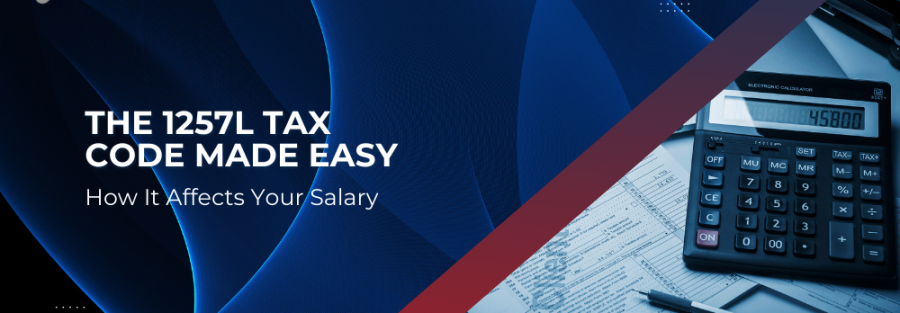If you’ve ever looked at your payslip and seen a code like “1257L” next to your name, you might have wondered what it means, and whether it’s something you need to worry about.
The short answer? Yes, it’s worth understanding.
Your tax code affects how much Income Tax is taken from your wages. It tells your employer how much of your income is tax-free, and how much should be taxed. In this guide, we’ll explain what the 1257L tax code means, who it applies to, and how it affects your take-home pay.
What Is a Tax Code?
A tax code is issued by HMRC (HM Revenue & Customs) and is made up of numbers and letters. It’s used by your employer or pension provider to calculate how much Income Tax to deduct from your pay through the PAYE (Pay As You Earn) system.
Each part of the code tells a small story about your personal tax situation.
Breaking Down the 1257L Tax Code
The 1257L tax code is the most common code used in the UK. Here’s what each part means:
- The number 1257 refers to your Personal Allowance, the amount you can earn tax-free each year. Multiply it by 10 and you get £12,570.
- The letter L means you’re entitled to the standard Personal Allowance, with no major adjustments.
So, if your tax code is 1257L, you won’t pay any tax on the first £12,570 you earn in a tax year. After that, normal tax rates apply.
How It Affects Your Take-Home Pay
If you’re on the 1257L tax code, your salary is taxed as follows:
- 0% on income up to £12,570 (Personal Allowance)
- 20% on income between £12,571 and £50,270 (Basic Rate)
- 40% on income from £50,271 to £125,140 (Higher Rate)
- 45% on anything above £125,140 (Additional Rate)
Let’s say you earn £30,000 per year:
- The first £12,570 is tax-free.
- The remaining £17,430 is taxed at 20%, which means you’ll pay £3,486 in Income Tax.
Keep in mind this doesn’t include National Insurance, which is a separate deduction also based on your earnings.
Who Gets the 1257L Tax Code?
Most employees in the UK are given the 1257L tax code if they:
- Earn under £50,270 per year (so they’re basic rate taxpayers).
- Don’t have taxable benefits like a company car or private medical insurance.
- Haven’t underpaid tax in previous years.
- Don’t have extra income (e.g. rental, investments, or second jobs) that hasn’t already been declared.
This tax code is ideal for people with one job and no unusual tax circumstances.
What If You Have Multiple Jobs or Income Sources?
If you have more than one job, HMRC usually applies your Personal Allowance to your main job. Your second job will likely have a BR (Basic Rate) tax code, meaning everything earned in that job is taxed at 20%, with no allowance.
If this doesn’t sound right for your situation, you can contact HMRC to split your allowance between jobs or correct any mistakes.
Can the 1257L Tax Code Change?
Absolutely. Your tax code can change at any time if your financial situation changes. Common reasons for a code change include:
- Starting a new job
- Receiving a pay rise
- Getting taxable benefits (like a car or health plan)
- Paying back underpaid tax
- Adding extra income (e.g. from investments or rental property)
HMRC might also update tax codes when the government adjusts the Personal Allowance in a new tax year.
How Do I Know If My Tax Code Is Correct?
You can find your tax code on your payslip, P60, or through your Personal Tax Account on the HMRC website. If something doesn’t look right like too much or too little tax being deducted, you should:
- Log in to your HMRC online account to check what they’ve recorded for you.
- Contact HMRC directly by phone or online to correct any issues.
- Speak to a tax advisor if you’re unsure or want help checking everything is accurate.
At Ryans, our tax specialists can review your tax code, help with HMRC communications, and make sure you’re paying the right amount, no more, no less.
Common Tax Code Questions
Does 1257L mean I won’t pay any tax?
Not exactly. It means you don’t pay tax on the first £12,570, but anything above that is taxed according to the standard rates.
I’ve got the wrong tax code, what should I do?
Contact HMRC to update your details. If you’re unsure how to do that, Ryans can help you sort it out.
Can my tax code change mid-year?
Yes. It often changes if your income, job, or benefits change.
Conclusion
Your tax code plays a big role in how much money ends up in your bank account. Understanding it, especially if it’s the 1257L code can help you avoid surprises and keep your tax affairs in order.
If you have any doubts, don’t ignore them. Whether you’ve changed jobs, added a side hustle, or just want to double-check you’re paying the right amount, we’re here to help at Ryans.
Want a professional to look over your tax code? Talk to us today.





